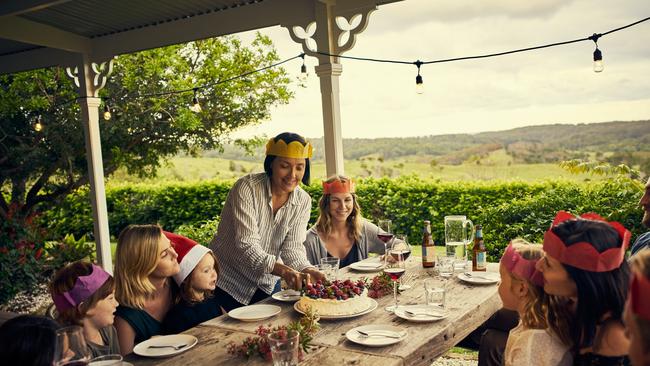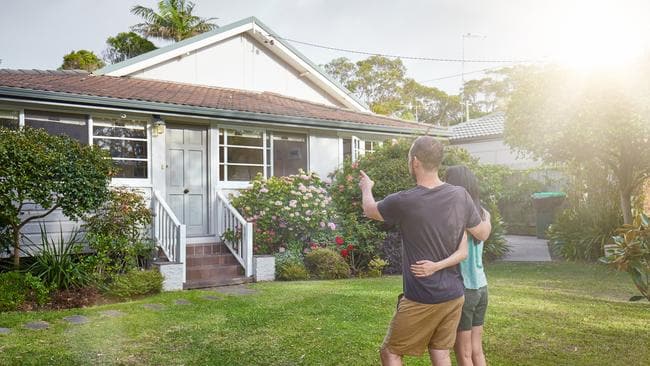Property prices have surprisingly lifted even after the downward spiral to the economy this year. Here are the suburbs that have been given a boost.
House prices are rising across the board in all Australian capital cities at the same time, even though we are in a pandemic.
REA group chief economist Nerida Conisbee said the slight downturn in the pandemic that dragged the economy down for the better part of this year had given rise to property growth.
“The property market is bouncing back very quickly. It’s national whether you’re in a capital city or regional area,” she said.
“The downturn in pricing was very short-lived. In many places we didn’t see any downturn compared to prior to the pandemic.
“Buyer confidence has definitely returned.”

There’s been property growth in capital cities and regional areas alike. Picture: iStock.Source:istock
Ms Conisbee said the boost in the property market is seen across the board on the back of low interest rates and government support during the pandemic.
“Interest rates are incredibly low and that’s allowing people to borrow more. Rules to accessing credit is changing so it’s easier to get loans,” she explained.
November marked a turning point because of the announcement of several vaccines as well as a new APAC trade agreement and opening up of domestic borders, Ms Conisbee said.
COASTAL SHIFT
A surprising trend is the growth in regional areas which is rivalling capital city growth on the back of our changing work and lifestyle conditions.
The biggest lift is in coastal areas, with beach haven Byron Bay the strongest growth area in Australia for 2020.
Ms Conisbee said buyers are looking for properties outside of the CBD as more people move out of bustling cities, possibly because of shifting work arrangements.
She added this shift has also impacted rental markets in the capital cities.
“There’s been a definite shift to regional areas as people are working differently and don’t need to be close to the city,” she said.
“The big trend at the moment is the growth in regional, particularly areas that offer a very nice lifestyle.
“At the top of the list is Pearl Beach on the Central Coast, offering a nice beachside lifestyle. Byron Bay and Sunshine Beach are up there as well.”

There’s been a shift towards regional and coastal homes as well as people buying holiday homes. Picture: iStockSource:istock
Ms Conisbee added that while Aussies have been stuck at home without the prospect of international travel this year, more people are looking to put their money into a holiday home.
“There’s growth in people looking at second homes and holiday homes because people can’t travel and don’t know when we will be able to travel again,” she said.
Ms Conisbee added that if you’re looking in a high-growth area, such as Byron Bay, don’t expect it to grow much more.
“If you’re hoping to see growth in a high-growth area in the next 12 months, it’s not likely,” she said. “They’ve hit their maximum level.”

There’s been growth across the board in Australia. Picture: iStockSource:News Regional Media
CAPITAL CITY GROWTH
Out of all the capital cities, it’s no surprise that Sydney properties are at the top of the property price growth in Australia, which also dominated the top property sales of 2019.
The market in Perth is strong as well as Canberra and Hobart.
“Conditions in Perth are improving rapidly,” she said. “Perth is doing well as is Sydney and Melbourne which is unusual, it’s usually one or the other.”
Melbourne is experiencing “surprising” growth despite the prolonged lockdown this year, with particular growth in the unit market.
“Rental market conditions remain weak in the aftermath of the coronavirus crisis, so it is surprising to see fairly strong unit price growth across capital cities,” Ms Conisbee said.
There are promising signs for NSW buyers with the removal of stamp duty in the state which is set to come in mid-2021.
Ms Conisbee indicated the change might slow the market down until the new policy comes into action.
“First homebuyers got the stamp duty concessions anyway but come June when the stamp duty changes are made in NSW they will also get a $25,000 bonus,” she added.
Suburbs recording largest year-on-year increase in median sale price over the past 12 months:
Brisbane
St Lucia – 37.5 per cent
Sandgate – 22.9 per cent
Virginia – 22 per cent
Highgate Hill – 20 per cent
Samford Valley – 19.4 per cent
Sydney
Pearl Beach – 45.5 per cent
North Willoughby – 43.8 per cent
Glenorie – 40.5 per cent
North Avoca – 38.6 per cent
Bayview – 34.1 per cent
Melbourne
Tyabb – 43.6 per cent
Aberfeldie – 24.4 per cent
Collingwood – 23.4 per cent
South Melbourne – 22.9 per cent
Coburg – 20.5 per cent
Hobart
Dodges Ferry – 29.4 per cent
Primrose Sands – 26.4 per cent
Carlton – 19.4 per cent
Rokeby – 18.1 per cent
Berriedale – 17.2 per cent
Adelaide
Millswood – 34.6 per cent
Hove – 33 per cent
Seacliff – 21.3 per cent
Blackwood – 21.1 per cent
Craigburn Farm – 20.7 per cent
Perth
Coodanup – 29.1 per cent
Kelmscott – 26.6 per cent
Medina – 20.3 per cent
Mount Nasura – 20 per cent
Madora Bay – 18.4 per cent
Article Source: news.com.au
from Queensland Property Investor https://ift.tt/2Wd5YkI
via IFTTT